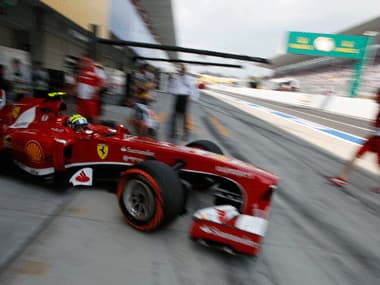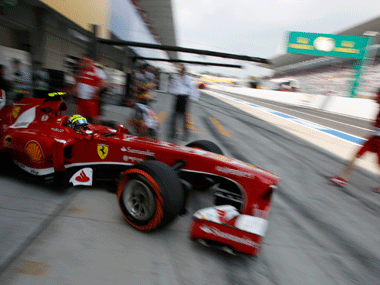By Abhishek Takle It’s night. The circuit of Suzuka lies dormant in the dark, the pin-drop silence broken only by the tinkle of tools and the grinding of wheel guns as mechanics fuss over the cars one last time. Lights blaze in the garages but walk down the pitlane and onto the start finish straight and you’re plunged into darkness. You pause, trying to reflect on the significance of the moment, the significance of standing on a stretch of tarmac where so many world champions have been crowned, so many legends have been forged, when all of a sudden and quite unexpectedly, this wall of history suddenly comes rushing at you out of the darkness. [caption id=“attachment_1168167” align=“alignleft” width=“380”]
 Japanese F1 Grand Prix at the Suzuka circuit. Reuters[/caption] A montage of images flashes through your mind, pictures from years gone by, grainy footage capturing moments of intense sporting drama and achievement, footage that you’ve watched over and over again as a Formula One-driver worshipping adolescent. World championships won and lost, a legend resurrected, one of the sport’s most bitter rivalries built up over two tumultuous seasons meeting its culmination at that one race circuit year after year in the fight for the ultimate prize. It feels eerie, standing there on the track in pitch darkness. You feel overwhelmed walking through corners where so much history has been made. It’s almost haunting, in a sense. You can hear the sound of the old engines long fallen silent on the breeze – you can hear Ayrton Senna going bam-bam-bam on the throttle, stabbing it in his distinctive style, you can hear Nigel Mansell and Alain Prost thundering through the ‘Esses’, or Spoon or 130R in their turbo-engined cars. Yes, Suzuka is special. It’s not as old as a Nordschleife, Silverstone or Monaco but the circuit is no less steeped in history for that and has carved a place for itself in motor-racing folklore. A regular on the Formula One calendar since 1987, (excluding 2007 and 2008 when the race returned to Fuji), the significance of Suzuka lies not in the fact that it winds its way through dense forests under brooding cliffs, because it doesn’t. Neither does it demand white-knuckle bravery from drivers to tackle effectively, despite its layout posing a challenge that only the very best drivers can master; nor does wind its way just meters away from glitzy casinos and fancy shop windows. No, the significance of Suzuka lies in the number of world champions it has crowned – eleven since it became a regular on the calendar in 1987 – and the way those titles have been decided, often in the most dramatic fashion. Senna, Prost, Piquet, Schumacher, have all clinched championships here. In fact, Suzuka forms an integral part of the Senna-Prost story, running like a thread throughout and serving as the crucible for some of the most defining moments of their intense rivalry. This is where it all always seemed to come to a head between the two. Then there was that race in 2000, when on that October day Michael Schumacher finally claimed the world championship for Ferrari, becoming the first driver to win the title for the Prancing Horse since Jody Sheckter in 1979, succeeding in his task to restore the Scuderia’s luster. And on Sunday it could decide the fate of another world championship. Sebastian Vettel heads into tomorrow’s race with the chance to claim his fourth-straight title. Of course, for that to happen, Vettel has to win with Fernando Alonso finishing no higher than ninth. True, it seems a bit of a stretch to think Vettel will leave Japan with the title all sewn up. But as unlikely as it may seem, could it happen, could Suzuka crown another world champion? A more fitting circuit there could not be.
Japanese F1 Grand Prix at the Suzuka circuit. Reuters[/caption] A montage of images flashes through your mind, pictures from years gone by, grainy footage capturing moments of intense sporting drama and achievement, footage that you’ve watched over and over again as a Formula One-driver worshipping adolescent. World championships won and lost, a legend resurrected, one of the sport’s most bitter rivalries built up over two tumultuous seasons meeting its culmination at that one race circuit year after year in the fight for the ultimate prize. It feels eerie, standing there on the track in pitch darkness. You feel overwhelmed walking through corners where so much history has been made. It’s almost haunting, in a sense. You can hear the sound of the old engines long fallen silent on the breeze – you can hear Ayrton Senna going bam-bam-bam on the throttle, stabbing it in his distinctive style, you can hear Nigel Mansell and Alain Prost thundering through the ‘Esses’, or Spoon or 130R in their turbo-engined cars. Yes, Suzuka is special. It’s not as old as a Nordschleife, Silverstone or Monaco but the circuit is no less steeped in history for that and has carved a place for itself in motor-racing folklore. A regular on the Formula One calendar since 1987, (excluding 2007 and 2008 when the race returned to Fuji), the significance of Suzuka lies not in the fact that it winds its way through dense forests under brooding cliffs, because it doesn’t. Neither does it demand white-knuckle bravery from drivers to tackle effectively, despite its layout posing a challenge that only the very best drivers can master; nor does wind its way just meters away from glitzy casinos and fancy shop windows. No, the significance of Suzuka lies in the number of world champions it has crowned – eleven since it became a regular on the calendar in 1987 – and the way those titles have been decided, often in the most dramatic fashion. Senna, Prost, Piquet, Schumacher, have all clinched championships here. In fact, Suzuka forms an integral part of the Senna-Prost story, running like a thread throughout and serving as the crucible for some of the most defining moments of their intense rivalry. This is where it all always seemed to come to a head between the two. Then there was that race in 2000, when on that October day Michael Schumacher finally claimed the world championship for Ferrari, becoming the first driver to win the title for the Prancing Horse since Jody Sheckter in 1979, succeeding in his task to restore the Scuderia’s luster. And on Sunday it could decide the fate of another world championship. Sebastian Vettel heads into tomorrow’s race with the chance to claim his fourth-straight title. Of course, for that to happen, Vettel has to win with Fernando Alonso finishing no higher than ninth. True, it seems a bit of a stretch to think Vettel will leave Japan with the title all sewn up. But as unlikely as it may seem, could it happen, could Suzuka crown another world champion? A more fitting circuit there could not be.
Abhishek has only one passion in life. Formula One. He watched his first race on television way back in the mid-nineties with his father and since then has been absolutely hooked. In his early teens, he harboured dreams of racing in the top flight of motorsport, fighting wheel-to-wheel with the likes of Schumacher, Hill and Hakkinen but when it became evident that he didn't quite have the talent to cut it in go karts, let alone Formula One, he decided to do the next best thing - write about the sport. Abhishek is happiest when there's a race on television or when he's indulging in his F1 fantasies on the PlayStation.
)